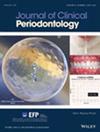牙周患者在牙科决策中的自主性偏好和信息寻求
IF 5.8
1区 医学
Q1 DENTISTRY, ORAL SURGERY & MEDICINE
引用次数: 0
摘要
背景和目的牙周病的治疗通常涉及多种治疗方案的复杂决策,而患者的自主性显著影响这一决策过程。本研究旨在描述诊断为III/IV期牙周炎患者的自主性和信息寻求偏好,并确定影响这些偏好的因素。材料与方法本研究纳入了96例诊断为牙周病的患者,这些患者均在2021年5月至2022年2月期间接受了牙周治疗或拔牙。参与者完成了一份包含自主偏好指数(API)的自我管理问卷,以评估他们的决策和信息寻求偏好,以及使用5分李克特量表的人口统计信息。结果决策偏好呈集中分布,得分为2.87±0.47 (mean±SD),表明大多数牙周患者倾向于协作决策模式。相比之下,信息寻求偏好是倾斜的,强烈集中于信息偏好的高端;得分为4.55±0.08。较低的年龄(p = 0.008)与更大自主权的偏好有关,而经济负担(p = 0.034)与减少信息寻求偏好有关。患者的自主性在不同的牙周临床情况下保持相对一致。结论牙周炎患者在诊断后更倾向于与医护人员分享决策责任。年龄和经济负担等因素会影响他们的自主性、参与度和对信息的渴望。本文章由计算机程序翻译,如有差异,请以英文原文为准。
Patient‐Centred Preferences for Autonomy and Information‐Seeking Among Periodontal Patients in Dental Decision Making
Background and AimManaging periodontal disease often involves complex decisions involving multiple treatment options, and patient autonomy significantly influences this decision‐making process. This study aimed to characterise the autonomy and information‐seeking preferences among patients diagnosed with stage III/IV periodontitis, and to identify the factors influencing these preferences.Materials and MethodsThe survey included 96 patients diagnosed with periodontal disease, all of whom underwent periodontal treatment or tooth extraction between May 2021 and February 2022. Participants completed a self‐administered questionnaire incorporating the Autonomy Preference Index (API) to assess their decision‐making and information‐seeking preferences, along with demographic information, using a 5‐point Likert scale.ResultsDecision‐making preferences were centrally distributed, with a score of 2.87 ± 0.47 (mean ± SD), indicating that most periodontal patients favoured a collaborative decision‐making model. In contrast, information‐seeking preferences were skewed, with a strong concentration towards the higher end of information preferences; the score was 4.55 ± 0.08. Lower age (p = 0.008) was associated with a preference for greater autonomy, while the financial burden (p = 0.034) was linked to reduced information‐seeking preferences. Patients' autonomy remained relatively consistent across different periodontal clinical scenarios.ConclusionThese findings suggest that periodontitis patients prefer to be well informed and share decision‐making responsibilities with healthcare professionals after their diagnosis. Factors such as age and financial burden affect their autonomy, involvement and desire for information.
求助全文
通过发布文献求助,成功后即可免费获取论文全文。
去求助
来源期刊

Journal of Clinical Periodontology
医学-牙科与口腔外科
CiteScore
13.30
自引率
10.40%
发文量
175
审稿时长
3-8 weeks
期刊介绍:
Journal of Clinical Periodontology was founded by the British, Dutch, French, German, Scandinavian, and Swiss Societies of Periodontology.
The aim of the Journal of Clinical Periodontology is to provide the platform for exchange of scientific and clinical progress in the field of Periodontology and allied disciplines, and to do so at the highest possible level. The Journal also aims to facilitate the application of new scientific knowledge to the daily practice of the concerned disciplines and addresses both practicing clinicians and academics. The Journal is the official publication of the European Federation of Periodontology but wishes to retain its international scope.
The Journal publishes original contributions of high scientific merit in the fields of periodontology and implant dentistry. Its scope encompasses the physiology and pathology of the periodontium, the tissue integration of dental implants, the biology and the modulation of periodontal and alveolar bone healing and regeneration, diagnosis, epidemiology, prevention and therapy of periodontal disease, the clinical aspects of tooth replacement with dental implants, and the comprehensive rehabilitation of the periodontal patient. Review articles by experts on new developments in basic and applied periodontal science and associated dental disciplines, advances in periodontal or implant techniques and procedures, and case reports which illustrate important new information are also welcome.
 求助内容:
求助内容: 应助结果提醒方式:
应助结果提醒方式:


